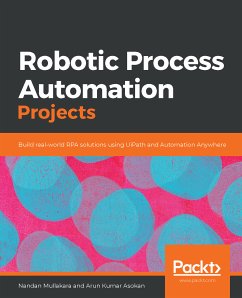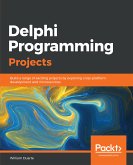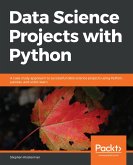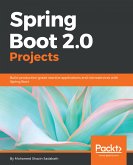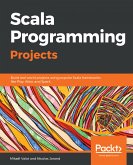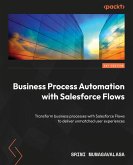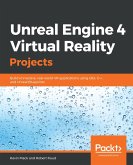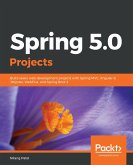Key Features
- Use popular RPA tools Automation Anywhere A2019 and UiPath, for real-world task automation
- Build automation solutions for domains such as System Administration, Finance, HR, Supply Chain, and Customer Relations
- Extend your RPA capabilities by implementing Intelligent process automation with APIs and AI
Book Description
Robotic Process automation helps businesses to automate monotonous tasks that can be performed by machines.
This project-based guide will help you progress through easy to more advanced RPA projects. You'll learn the principles of RPA and how to architect solutions to meet the demands of business automation, along with exploring the most popular RPA tools - UiPath and Automation Anywhere. In the first part, you'll learn how to use UiPath by building a simple helpdesk ticket system. You'll then automate CRM systems by integrating Excel data with UiPath. After this, the book will guide you through building an AI-based social media moderator using Google Cloud Vision API. In the second part, you'll learn about Automation Anywhere's latest Cloud RPA platform (A2019) by creating projects such as an automated ERP administration system, an AI bot for order and invoice processing, and an automated emergency notification system for employees. Later, you'll get hands-on with advanced RPA tasks such as invoking APIs, before covering complex concepts such as Artificial Intelligence (AI) and machine learning in automation to take your understanding of RPA to the next level.
By the end of the book, you'll have a solid foundation in RPA with experience in building real-world projects.
What you will learn
- Explore RPA principles, techniques, and tools using an example-driven approach
- Understand the basics of UiPath by building a helpdesk ticket generation system
- Automate read and write operations from Excel in a CRM system using UiPath
- Build an AI-based social media moderator platform using Google Cloud Vision API with UiPath
- Explore how to use Automation Anywhere by building a simple sales order processing system
- Build an automated employee emergency reporting system using Automation Anywhere
- Test your knowledge of building an automated workflow through fun exercises
Who this book is for
This RPA book is for enterprise application developers, software developers, business analysts, or any professional who wants to implement RPA across various domains of the business. The book assumes some understanding of enterprise systems. Computer programming experience will also be beneficial.
Dieser Download kann aus rechtlichen Gründen nur mit Rechnungsadresse in A, B, BG, CY, CZ, D, DK, EW, E, FIN, F, GR, HR, H, IRL, I, LT, L, LR, M, NL, PL, P, R, S, SLO, SK ausgeliefert werden.

